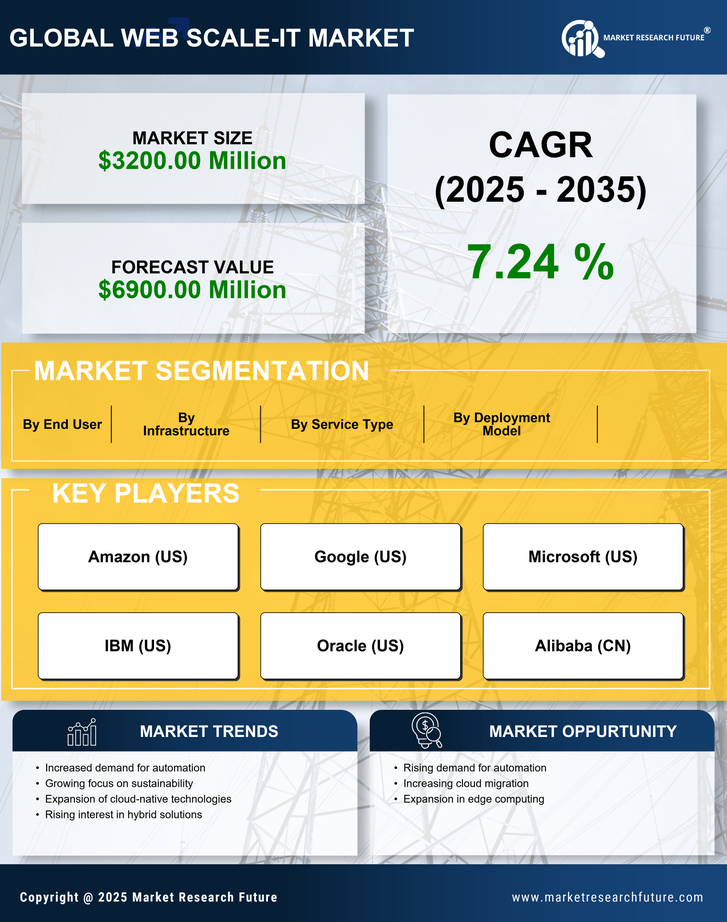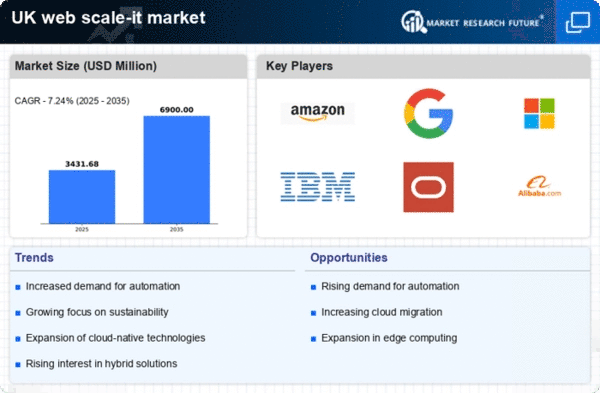Rising Demand for Scalability
The web scale-it market in the UK is experiencing a notable increase in demand for scalable solutions. As businesses expand their digital operations, the need for infrastructure that can grow seamlessly becomes paramount. This trend is driven by the necessity for companies to handle fluctuating workloads efficiently. According to recent data, approximately 70% of UK enterprises are prioritising scalability in their IT investments. This shift indicates a growing recognition of the importance of adaptable systems that can accommodate future growth. The web scale-it market is thus positioned to benefit from this rising demand, as organisations seek to implement solutions that not only meet current needs but also anticipate future challenges.
Increased Focus on Data Analytics
The web scale-it market in the UK is witnessing a heightened emphasis on data analytics capabilities. As businesses generate vast amounts of data, the ability to analyse and derive insights from this information is becoming essential. Approximately 65% of UK firms are investing in advanced analytics tools to enhance decision-making processes. This trend reflects a growing understanding of the value of data-driven strategies in achieving competitive advantage. Consequently, the web scale-it market is adapting to meet the needs of organisations seeking to leverage data analytics for improved operational efficiency and strategic planning.
Emergence of Edge Computing Solutions
Edge computing is emerging as a transformative force within the web scale-it market in the UK. This technology decentralises data processing, allowing for faster response times and reduced latency. As more devices connect to the internet, the demand for edge computing solutions is expected to rise significantly. Recent projections indicate that the edge computing market could grow by over 40% in the next five years. This shift is likely to influence the web scale-it market, as organisations seek to implement solutions that enhance performance and reliability in an increasingly connected world.
Advancements in Automation Technologies
Automation technologies are playing a crucial role in shaping the web scale-it market in the UK. The integration of automated processes allows for enhanced efficiency and reduced operational costs. Recent statistics suggest that companies adopting automation in their IT operations have seen a reduction in costs by up to 30%. This trend is indicative of a broader movement towards optimising resource allocation and minimising human error. As organisations increasingly recognise the benefits of automation, the web scale-it market is likely to witness significant growth. The potential for improved performance and reliability through automation is driving investment in innovative solutions that align with these technological advancements.
Growing Importance of Hybrid IT Environments
The web scale-it market in the UK is increasingly characterised by the adoption of hybrid IT environments. This approach combines on-premises infrastructure with cloud services, offering organisations greater flexibility and control over their IT resources. Recent surveys indicate that around 60% of UK businesses are utilising hybrid models to optimise their operations. This trend suggests a shift towards more versatile IT strategies that can adapt to changing business needs. The web scale-it market is thus likely to evolve in response to this growing preference for hybrid solutions, as companies seek to balance the benefits of both cloud and traditional infrastructures.

















